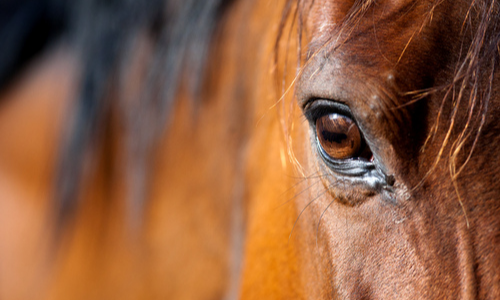
Common Eye Infections in Horses
Infections can cause permanent damage to your horse's eyesight if treatment is delayed. If you notice any of these common eye infection signs, call your equine veterinarian as soon as possible.
Conjunctivitis
If you've ever had conjunctivitis (pink eye), you understand just how uncomfortable the infection can be. Conjunctivitis causes red, sore eyes that water frequently. You may also notice a yellow discharge that may seem to glue your horse's eyelids together. Horses with pink eye often squint because the infection makes their eyes particularly sensitive to light. Conjunctivitis can affect the whites of the eyes and the eyelids or the eyelids alone.
The infection can be caused by exposure to dust, pollen, or allergens. Insect bites, irritation from flies, and viral or bacterial infections may also cause conjunctivitis. Rinsing your horse's eyes with saline solution can be helpful in relieving symptoms. If the infection is caused by bacteria, your equine veterinarian will prescribe antibiotic eye drops. Since it's difficult to determine the cause of your horse's symptoms, it's important to call the vet at the first sign of eye issues.
EQUUS Magazine recommends fitting horses with fly masks during insect season and keeping them inside during daylight hours and dust storms to prevent conjunctivitis.
Equine Recurrent Uveitis (URI)
As its name implies, ERU (also known as "moon blindness") can occur more than once and may be challenging to control. Technically an inflammation, ERU is the most common cause of blindness in horses, according to the Merck Manual.
ERU symptoms can include redness, swelling, squinting, sensitivity to light, and pus in the eye. If uveitis becomes a chronic condition, your horse's eyes may begin to look cloudy or cataracts may form. ERU may cause swelling of the cornea, the clear layer of tissue over the iris and pupil, and inflammation or degeneration of the retina, the layer of light-sensing cells at the back of the eye. Damage to the retina can affect your horse's ability to see well.
Reducing inflammation is the goal of treatment. Your vet may prescribe corticosteroids or nonsteroidal anti-inflammatory oral medications and ointments. Antibiotics may also be recommended. A vitrectomy or implantation of a sustained-release cyclosporine device (CsA) may be options in severe cases.
CsA devices release small amounts of medication into the eye for as long as four years, while vitrectomies remove the vitreous, the clear gel inside the eye.
Fungal Eye Infections
Fungi thrive in your horse's environment and are found in hay, straw, grass, and dust in fields and stables. Fungal spores can easily enter your horse's eye through a cut or scratch. Even a small scratch on the eye can increase your horse's risk of developing fungal keratitis, an infection that can cause vision loss in some cases.
Although a fungal infection may cause noticeable ulcers, symptoms may not always be obvious. As with other types of infections, tearing, sensitivity to light, squinting, and redness can occur. You may also notice that your horse's eyes look a little blue.
Fungal eye infections may be treated with topical pain medication, anti-fungal and antibiotic ointments, or oral anti-inflammatory medication. Surgery may be needed to treat severe ulcers that don't respond to other treatments.
Prompt treatment is the key to preventing lasting vision issues due to eye infections. If your horse displays any of these eye infection signs, call our office to schedule a visit.
Sources:
Merck Manual: Equine Recurrent Uveitis, 5/19
EQUUS Magazine: Eyeballing Conjunctivitis in Horses, 4/29/20
Texas A&M College of Veterinary Medicine & Biomedical Sciences: Eye Infections in Horse, 8/26/17
The Horse: Diagnosing, Treating, and Managing Equine Recurrent Uveitis, 10/11/12
